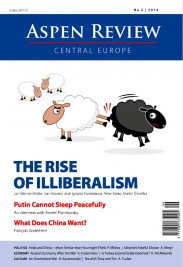Explore the newest Aspen Review Central Europe discussing the topic of illiberalism.
Illiberalism is a persistent political phenomenon that has recently been gaining on strength. Repercussions of the economic crisis and increasing tensions between Ukraine and Russia provide a fertile ground for extremism, populism, nationalism and undemocratic tendencies.
Ivan Krastev argues in the Review that an alternative to liberal democracy has arisen in Europe. Jan-Werner Muller further analyses the potential of Victor Orban’s and Vladimir Putin’s political leadership to turn into a political ideology. The issue also explores contradictions in the Russian influence on the European radical right political parties, whereas Martin Šimečka's article indicates that the real threat to liberal democracy in Europe comes from Central Europe.
Despite a strong European focus, the issue offers insights into political dynamics in other parts of the world. For example, French analyst Francois Godement explains how the political landscape in China changed under president Xi Jinping, and an Indian essayist Pankaj Mishra points out some unexpected similarities between China and India. For an investigation into the Russian economy and possible costs it may endure due to the Ukrainian conflict, please refer to Vladislav Inozemtsev’s articles. We also recommend a number of book reviews, including Scruton’s “Notes from the Underground”, which tells a story of a member of political dissent in Prague under the Communist regime.
All Aspen Review articles, past and present, are now available on-line. You can either read a particular text on-line or browse the whole issue in pdf format here.

